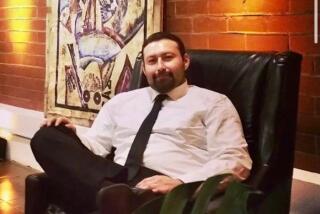D.A. to Seek Death Penalty in Slaying of Deputy
Prosecutors will seek the death penalty against Michael Raymond Johnson, a 49-year-old former drug counselor accused of fatally shooting Sheriff’s Deputy Peter J. Aguirre last summer.
The decision was announced late Tuesday after a meeting between Ventura County Dist. Atty. Michael D. Bradbury and his top prosecutors, who also consulted with the 26-year-old deputy’s family in Santa Paula. Aguirre is survived by a wife and a young daughter.
Sheriff Larry Carpenter praised the decision. He had asked Bradbury to seek death in the Aguirre slaying, which marked the first time in 27 years that a deputy was shot to death while on duty.
“I welcome his decision,” Carpenter said Tuesday. “I say that bearing in mind that taking a human life is an extraordinary act.”
Johnson has pleaded not guilty to murder and four other charges in the July 17 shooting of Aguirre, which happened at the home of Johnson’s estranged wife in Meiners Oaks.
Aguirre and three other officers went to the woman’s home to investigate a domestic disturbance. Aguirre was shot after walking into the house with his gun still holstered, authorities said.
Prosecutors say Johnson burst naked from a shower, firing at Aguirre from several yards away. They say he then walked over to the fallen deputy and shot him once in the head at point blank range.
Defense attorneys have suggested that Johnson was suffering from a delusional disorder brought on in part by a tour in Vietnam in the late 1960s that caused him to act crazy the day of the shooting.
But prosecutors don’t see it that way.
“The D.A.’s position is that those are not necessarily things that we believe are accurate,” Deputy Dist. Atty. Matthew Hardy III said.
However, he declined to elaborate. “We are not going to get into pulling the case into the public, trying it in the press,” he said.
Prosecutors had wanted to see Johnson’s military and mental health records, which have been sealed, before deciding whether to seek the death penalty.
But Hardy said he was able to get some information about Johnson’s mental health history from defense attorneys prior to a hearing set for Friday on a motion to unseal those records.
“We gave an opportunity to the public defender,” he said. “We considered their input.”
Public Defender Todd Howeth declined to comment on the prosecutors’ decision Tuesday, saying he had not been informed of it.
Johnson has a criminal history dating back 28 years--a rap sheet that prosecutors considered in deciding whether to seek death, they said.
Since 1968, Johnson has served time in state and federal prison for burglary, armed robbery, selling drugs and other crimes in at least three states.
But according to friends, Johnson was trying to turn his life around before the shooting. He lived in Ventura and volunteered at a halfway house for people with alcohol and drug problems.
“It is very difficult in a case like this,” Hardy said of the decision to seek death. “[Johnson] is entitled to a fair trial, as is the family of the victim and the Sheriff’s Department.”
Johnson is the fourth defendant in Ventura County now facing a possible death sentence if convicted.
In December, prosecutors decided to seek the death penalty against Michael Dally and Diana Haun, who are accused of planning and carrying out the kidnap-slaying of Dally’s wife, Sherri. Their highly publicized trial is set to start May 20.
In November, prosecutors decided to seek the death penalty against Alan Holland, a drifter accused of shooting Oxnard resident Mildred Wilson to death during a carjacking at a Ventura shopping center. Holland’s trial is set to begin May 5.
Johnson’s trial date is expected to be set during Friday’s hearing.
Hardy acknowledged that the timing of the death penalty cases probably will put a strain on the courts, since capital cases typically monopolize courtrooms for several weeks to months.
But that was not something that would influence the district attorney’s decisions, he said.
“We just have to get through these things,” he said.
More to Read
Sign up for Essential California
The most important California stories and recommendations in your inbox every morning.
You may occasionally receive promotional content from the Los Angeles Times.










